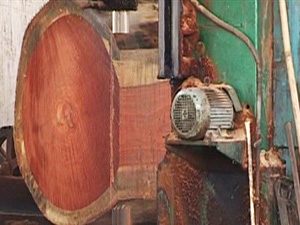 Myanmar Timber Trade and Industry published a complete list of tree species thare are commercially harvested in Myanmar.
Myanmar Timber Trade and Industry published a complete list of tree species thare are commercially harvested in Myanmar.
Criterion of Grouping is based on: Commercial importance, Usage, Durability, Availability and Seasoning.
Climate, Food, Economy
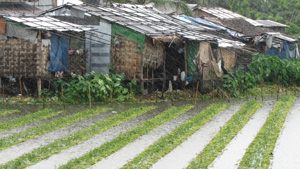 From an administrative point of view, land can be classified into the following eleven categories. A brief overview on the nature and legal status of each of them is portrayed in this report prepared by United Nations Habitat.
From an administrative point of view, land can be classified into the following eleven categories. A brief overview on the nature and legal status of each of them is portrayed in this report prepared by United Nations Habitat.
Classifications include; Freehold Land, Grant Land, Agricultural Land, Garden Land, Grazing Land, Culturable Land, Fallow Land and Waste Land, Forest Land, Town Land, Village Land, Cantonments and Monastery.
Eleven Classifications of Land Holdings in Myanmar U.N. Report PDF
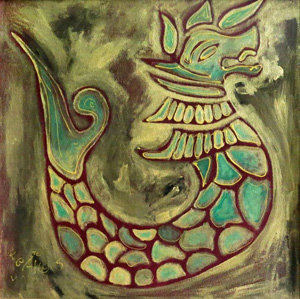 Illegal trade in ivory products remains widespread, especially in markets along Myanmar’s international borders. TRAFFIC surveyed 14 markets in Myanmar and three border markets in Thailand and China, and found some 9000 pieces of ivory and 16 whole tusks for sale, representing the ivory of an estimated 116 bulls.
Illegal trade in ivory products remains widespread, especially in markets along Myanmar’s international borders. TRAFFIC surveyed 14 markets in Myanmar and three border markets in Thailand and China, and found some 9000 pieces of ivory and 16 whole tusks for sale, representing the ivory of an estimated 116 bulls.
Average estimate amounts of ivory that can be obtained per male Asian Elephant are 13.6 kg. Raw tusks or pieces of tusks weighing less than 1 kg, sold for USD 42–85 per kg, those of around 1.6–2.4 kg sold for USD 142 per kg, but tusks of more than 16 kg sold for USD 355–497 per kg.
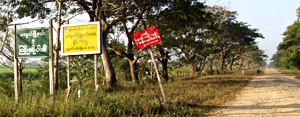 You have heard of BRIC countries over the last five years, the next acryonym that you will begin seeing more of is CLMV, which are the emerging economies of S.E. Asia; Cambodia, Laos, Myanmar and Vietnam.
You have heard of BRIC countries over the last five years, the next acryonym that you will begin seeing more of is CLMV, which are the emerging economies of S.E. Asia; Cambodia, Laos, Myanmar and Vietnam.
The CLMV Project overview covers how these countries will promote equitable and inclusive growth. Key Themes are: Agricultural Productivity and Natural Resources Management, Macroeconomic Stability and Financial Markets, Capital account liberalization and Free Trade Agreements and Regional Trade Policy.
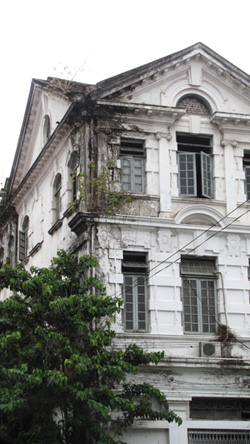 I picked up the newest listing of available hotels from the airport information counter last month.
I picked up the newest listing of available hotels from the airport information counter last month.
Prices are much higher than other S.E Asian countries and the quality of each room is hit or miss unless staying at a four star or higher residence.
Hotel price/quality is 3-5 times higher than Thailand for example. I have used Agoda.com for all of my bookings so far in Yangon.
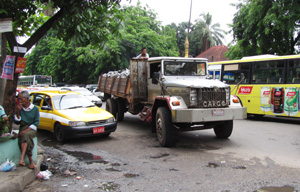 The study assessed Myanmar’s existing national program for large-scale growing of biofuel crops, and the policies to encourage growers, to determine their impact on the well-being of the rural poor. It also investigated the feasibility of establishing small-scale extraction plants that can generate income and job opportunities in rural areas.
The study assessed Myanmar’s existing national program for large-scale growing of biofuel crops, and the policies to encourage growers, to determine their impact on the well-being of the rural poor. It also investigated the feasibility of establishing small-scale extraction plants that can generate income and job opportunities in rural areas.
Included was the process of establishing biofuel processing plants, and to learn the business arrangements and mechanisms to encourage public–private participation in biofuel production and distribution.
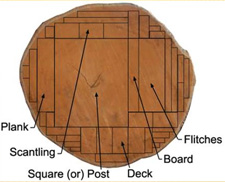 This PDF was from the Myanmar Private Sector Investment Summit in Feb 2013. The subjects covered are sawmills, furniture factories, secondary product laminants, types of tree species used in commercial logging, timber management system, SWOT analysis of the industry.
This PDF was from the Myanmar Private Sector Investment Summit in Feb 2013. The subjects covered are sawmills, furniture factories, secondary product laminants, types of tree species used in commercial logging, timber management system, SWOT analysis of the industry.
The most important slide is the allowable cut starting from 2014, which will reduce the amount of available hardwoods for export and processing.
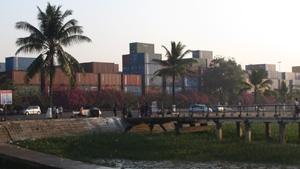 A comprehensive look at Myanmar trade statistics including Primary Products, Manufacturing, Machinery, Agriculture, Natural Resources and trade volumes between its trading partners with a focus on Myanmar-EU Bilateral Trade.
A comprehensive look at Myanmar trade statistics including Primary Products, Manufacturing, Machinery, Agriculture, Natural Resources and trade volumes between its trading partners with a focus on Myanmar-EU Bilateral Trade.
Myanmar-EU Bilateral and Global Trading Partners Statistics 2013 PDF
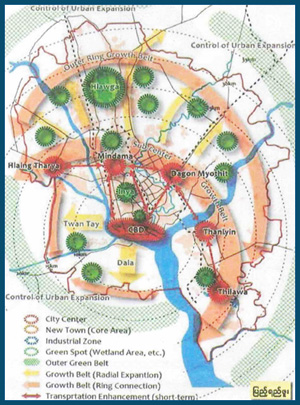 Digging through a stack of local newspapers I bought on my last trip to Yangon I ran across this city plan for the development of Yangon, inclusive or ring roads, green belts and flyover highways connecting west Yangon to the Thilawa Special Economic Zone.
Digging through a stack of local newspapers I bought on my last trip to Yangon I ran across this city plan for the development of Yangon, inclusive or ring roads, green belts and flyover highways connecting west Yangon to the Thilawa Special Economic Zone.
Witnessing the changes first hand visiting Yangon over the last nine months, I believe that the 2020 completion date is overly optimistic. Plans are implemented at a slower pace than most investors are willing to wait for as most government ministers do not want to take a firm stance on anything because if they are on the wrong side they are replaced. Silence, delaying deals and non-decision making are golden rules in Yangon from the government end.
 While I was in Yangon attending the 2013 Renewable Energy, Energy Efficiency Business & Finance Forum I picked up a list of associations residing at Union of Myanmar Federation of Chambers of Commerce and Industry (UMFCCI) building in Yangon.
While I was in Yangon attending the 2013 Renewable Energy, Energy Efficiency Business & Finance Forum I picked up a list of associations residing at Union of Myanmar Federation of Chambers of Commerce and Industry (UMFCCI) building in Yangon.
List of associations residing at the UMFCCI building in Yangon PDF
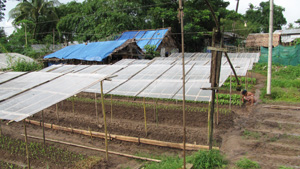 The financial sector in Myanmar is small and underdeveloped. Some industry estimates and recent research suggesting that less than 20 percent of the population has access to formal financial services.
The financial sector in Myanmar is small and underdeveloped. Some industry estimates and recent research suggesting that less than 20 percent of the population has access to formal financial services.
Demand for microfinance is high, however, few institutions provide microcredit, and unmet demand is estimated by industry experts at close to US$ 1 billion. Use of informal providers of credit and transfer services in both urban and rural areas is widespread despite the additional risks and expense (10–20 percent per month).
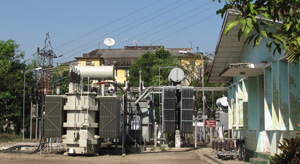 A look at Myanmar’s Major Coal Mines which have reserves of over 10 million tons throughout the Saigang Region and Shan State.
A look at Myanmar’s Major Coal Mines which have reserves of over 10 million tons throughout the Saigang Region and Shan State.
Kalewa Area: Total Coal Reserves ‐ 214 million tons, Coal Type ‐ Lignite and Sub‐bituminous
Eastern Shan Area: Total Coal Reserves ‐ 143 million tons, Coal Type – Lignite and Sub‐bituminous
Lashio Area: Total Coal Reserves ‐ 29 million tons, Coal Type ‐ Lignite
Tigyit Area: Total Coal Reserves ‐ 20 million tons, Coal Type ‐ Lignite
Ensuring a Sustainable Coal Supply in Myanmar for Electrical Generation 2013
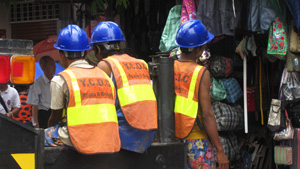 Myanmar’s construction industry is expected to grow at 7.8% in USD and kyat terms over the next 5 years.
Myanmar’s construction industry is expected to grow at 7.8% in USD and kyat terms over the next 5 years.
The increase in the number of investment opportunities in energy and public infrastructure projects, in particular, large rail, pipeline and hydropower projects that attracted US$20bn in FDI in 2011.
Expect the pace of new opportunities to moderate but still grow a healthy 9% a year.
A Quick Look 2013-2017: Construction & Infrastructure in Myanmar PDF
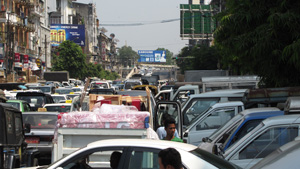 The Asia Society takes stock of progress and challenges in Myanmar’s reform process over the past two years and thinks through the 2015 general election.
The Asia Society takes stock of progress and challenges in Myanmar’s reform process over the past two years and thinks through the 2015 general election.
Among the most urgent priorities are resolving ethnic and secretarian conflicts within a diverse society, creating jobs for the vast majority of the population who live in poverty, continuing to transform the role of the military, tackling corruption, and establishing the rule of law for commerce.
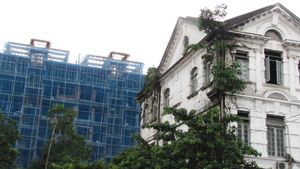 The UN Strategic Framework for Myanmar (2012-2015) has thirteen Outcome-Level results, grouped under four Strategic Priorities.
The UN Strategic Framework for Myanmar (2012-2015) has thirteen Outcome-Level results, grouped under four Strategic Priorities.
Strategic Priority 1: Encourage inclusive growth (both rural and urban), including agricultural development and employment opportunities.
U.N. Strategic Framework for Myanmar’s Development 2012-2015
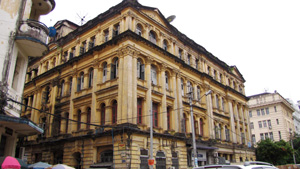 In the opaque world of Myanmar’s banks and governments tight lipped information stance, this is the most complete list I have found in my research into the newly opened country's banking sector. The report covers:
In the opaque world of Myanmar’s banks and governments tight lipped information stance, this is the most complete list I have found in my research into the newly opened country's banking sector. The report covers:
The Central Bank of Myanmar, Myanma Economic Bank Myanma, Foreign Trade Bank Myanmar Investment and Commercial Bank Myanma Agricultural Development Bank.
Ayeyarwady Delta Carbonate Prospect
Chindwin Basin Eocene Prospects
Salin Basin Prospect
Yeyein Prospects
Central Myanmar Oil Fields of Kyaukkwet, Letpando and Ngahlaingdwin
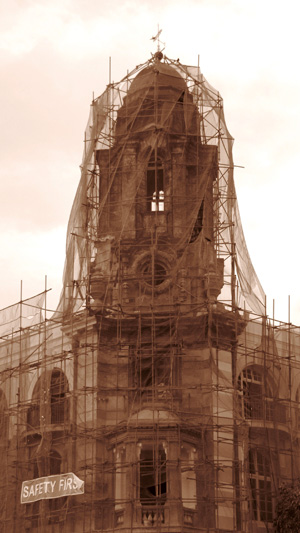 Geopolitics and Myanmar’s Petroleum Sector presentation takes a look at the International Assessment on Myanmar Petroleum Industries; Perceptions and Opportunities.
Geopolitics and Myanmar’s Petroleum Sector presentation takes a look at the International Assessment on Myanmar Petroleum Industries; Perceptions and Opportunities.
Summary, of Onshore, Offshore and Infrastructure includes; Onshore and Offshore Production Sharing Contract (PSC) 2011; General Terms and Condition of PSCs
Outlook of Foreign Investment & Opportunities in Petroleum-Upstream Sectors
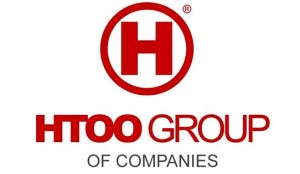 As rumors of the Myanmar Stock Market begin, here is a company that will assuredly be listed, Htoo Group. Speculation remains as to the status of Tay Za's listing on the U.S. Special Designated Nationals List (SDN).
As rumors of the Myanmar Stock Market begin, here is a company that will assuredly be listed, Htoo Group. Speculation remains as to the status of Tay Za's listing on the U.S. Special Designated Nationals List (SDN).
The Htoo Group of Companies (HGC) is the parent company of Air Bagan, a privately held Myanmar airline company. The company has several subsidiaries. Htoo Wood Products Company Ltd. is engaged in logging and export of timber. HGC is engaged in construction, property development, agriculture, transportation, shipping, mining, hotels and tourism operations.